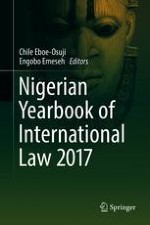2018 | OriginalPaper | Buchkapitel
Environmental Victims, Access to Justice and the Sustainable Development Goals
verfasst von : Engobo Emeseh
Erschienen in: Nigerian Yearbook of International Law 2017
Aktivieren Sie unsere intelligente Suche, um passende Fachinhalte oder Patente zu finden.
Wählen Sie Textabschnitte aus um mit Künstlicher Intelligenz passenden Patente zu finden. powered by
Markieren Sie Textabschnitte, um KI-gestützt weitere passende Inhalte zu finden. powered by
